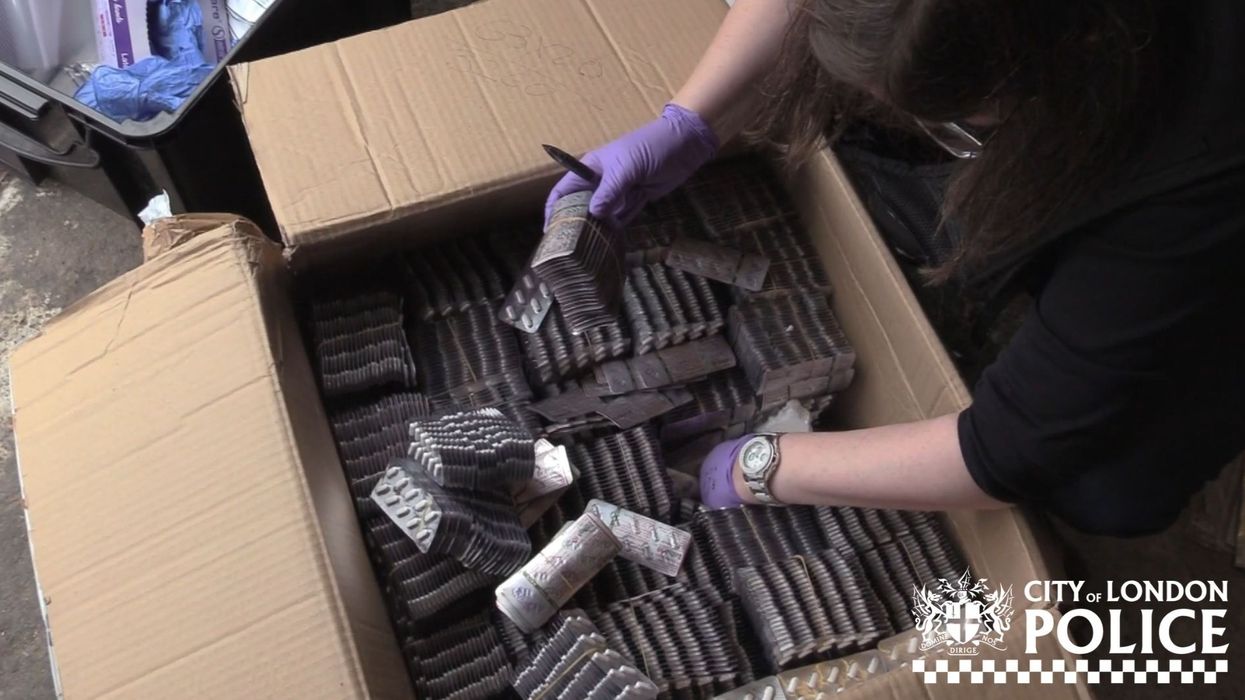During the operation, police seized thousands of illicit drugs, including opioids and benzodiazepines, from a storage unit in Wembley
Three Wembley drug gang members have been sentenced for their involvement in a large-scale importation and distribution of unregulated pharmaceutical drugs into the UK from India.
Salman Ansari, 33, and his wife Juhi Ansari, 32, of Central Road, Wembley, were among the defendants who were found guilty after a six- week trial and sentenced on 25 October at Southwark Crown Court.
Salman and another gang member Waqas Saleem, 33, of Sylvia Gardens, Wembley, were found guilty of 12 counts of possession with intent to supply drugs (Class A, B and C), one count of conspiracy to supply Class C and one count of money laundering.
While Salman received a six-year prison sentence, Waqas Saleem was sentenced to two and a half years.
Juhi was found guilty of one count of money laundering and received a suspended sentence, requiring her to complete 100 hours unpaid work and 25 days rehab.
During the operation, the City of London Police seized over 730kg of drugs, including opioids and benzodiazepines, which are commonly misused for their sedation effect and can be fatal when combined.
The haul consisted of more than 1,000,000 tablets, which include nine Class C drugs (zolpidem, zopiclone, nitrazepam, tramadol, etizolam, pregabalin, flubromazolam, bromazolam, alprazolam), one Class B (cannabis resin) and one Class A (tapentadol).
The imported drugs were repackaged in the UK and distributed internationally, according to police reports.
Detective Constable Syed Shah, from the serious organised crime team, City of London Police said: “Today’s result is the culmination of numerous law enforcement agencies, working together from across the world, over a period of more than three years.
“The illegal importation of drugs has a devastating impact on the public. These drugs in particular are subject to an emerging trend of misuse due to their availability and affordability.”
He noted that many of the seized drugs were unregulated products for the UK market, and the investigation team encountered counterfeited brands such as Xanax combined with flubromazolam with unknown dose and potency.
“The withdrawal from drugs such as pregabalin can be more severe than opiate withdrawal and presents the user with a risk to life,” Shah warned.
The investigation began in October 2020 when US Customs and Border seized numerous shipments sent from the UK that were found to contain illicit pharmaceutical drugs.
By tracing the packages being sent from the UK, Salman and Waqas were identified as the individuals responsible for these shipments, leading to the execution of search warrants in June 2021 in Vermont, USA, where pharmaceutical drugs were discovered.
City of London Police traced the drop-off locations of the drugs, which led them to a storage unit in Wembley.
In July 2021, both men were arrested at the storage unit for conspiracy to supply controlled drugs and money laundering.
Officers also discovered a significant quantity of large cardboard boxes containing thousands of blister packs of what appeared to be pharmaceutical-grade drugs, resulting in the seizure of 175 exhibits.
Salman’s wife Juhi was also arrested for money laundering.
Financial investigations revealed that Salman Ansari had over 11 bank accounts in his name, with a credit turnover of £1.09m.
Between March 2018 and September 2021, he made over 158 transactions to his wife, totalling more than £265,0000.
Additionally, between April and July 2021, he transferred over £7,000 to Waqas.
Furthermore, it was found that Salman sent approximately $62,120 (around £46,458) to India, and similarly, Juhi sent about $55,050 (around £41,194).
Despite all defendants pleading not guilty, the jury unanimously found all three guilty on all counts.











![Potential Side Effects of Mounjaro [What You Need to Know]](https://www.pharmacy.biz/media-library/image.jpg?id=54516976&width=1245&height=700&quality=90&coordinates=0%2C29%2C0%2C29)





